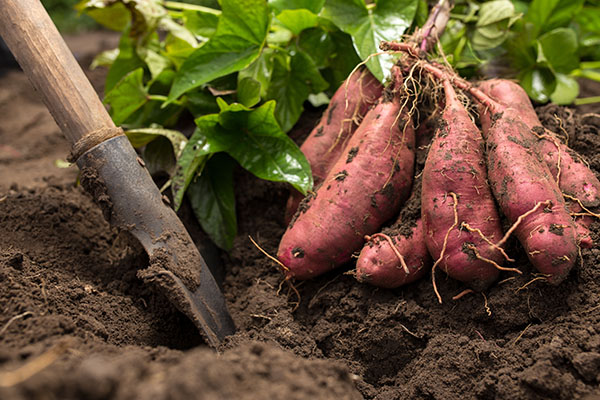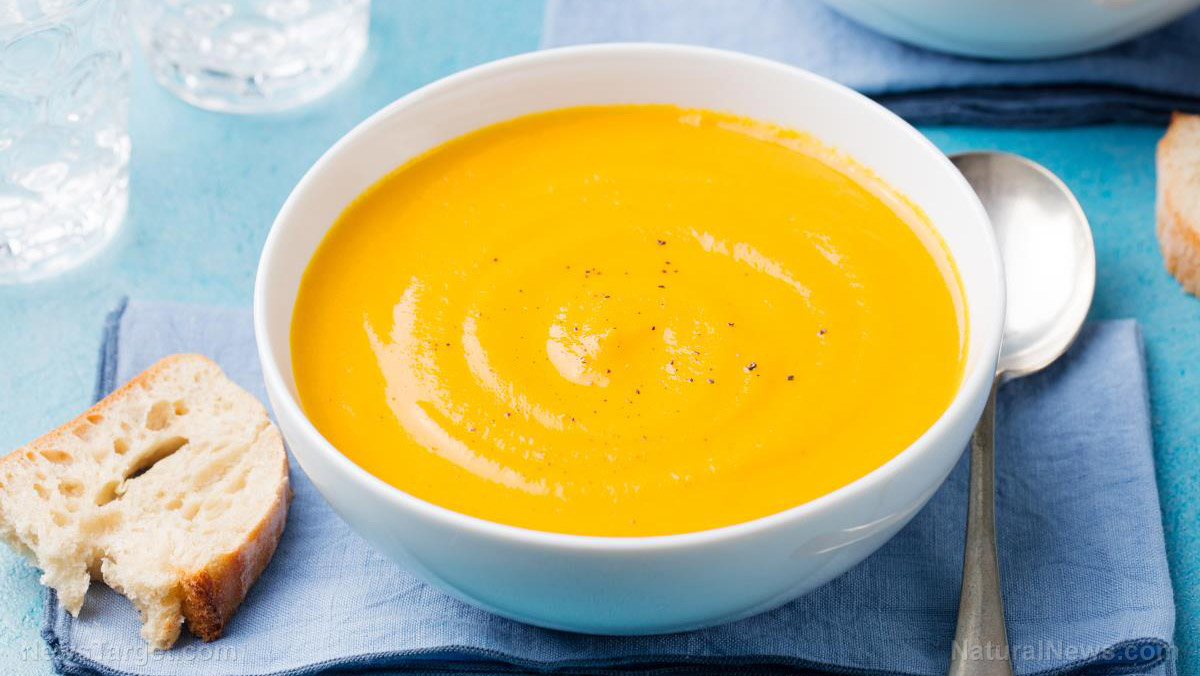Curcumin in turmeric found to suppress cancer growth in clinical trials
11/21/2023 / By Evangelyn Rodriguez

Turmeric is the rhizome, or underground stem, of Curcuma longa, a plant that belongs to the ginger family. Dubbed the “golden spice” because of its brilliant yellow color, this edible herb is well-known for its many health benefits.
As a culinary ingredient, turmeric is widely known as the spice that gives Indian curry its signature hue. It is also promoted as a dietary supplement that helps with a variety of conditions, such as allergies, arthritis, depression, digestive disorders, liver disease and respiratory infections.
Besides its relation to curry, turmeric’s claim to fame comes from its long history of medicinal use. A staple herb in Ayurvedic Medicine – one of the world’s oldest medical systems – turmeric is traditionally used in India as a natural remedy for anorexia, biliary disorders, cough, diabetic sores, hepatic disorders, rheumatism and sinusitis.
Turmeric boasts a wide range of beneficial properties, including antioxidant, anti-inflammatory, antimicrobial, neuroprotective, antidiabetic and anti-carcinogenic activities. According to studies, these properties can be attributed to curcumin, turmeric’s main active component and the chemical responsible for its distinct color and flavor. (Related: Turmeric: 6 Medicinal benefits and home remedies.)
Curcumin is one of three compounds in turmeric known collectively as curcuminoids. These phenolic compounds are commonly used as food coloring (yellow) or additives. Curcuminoids, particularly curcumin, have attracted considerable scientific interest because of their potential to treat immune-related and metabolic diseases, most notably different types of cancer.
Curcumin as an anticancer agent in clinical trials
Curcumin from turmeric is the most studied plant compound against human cancer. A potent anti-inflammatory agent, curcumin is said to work by regulating inflammatory signaling pathways and inhibiting the production of inflammatory mediators. Curcumin can also suppress inflammation by regulating the activity of pro-inflammatory immune cells and reducing the production of reactive oxygen species (ROS) through its antioxidant activities, thus preventing oxidative stress. Oxidative stress is known to enhance inflammation, which is linked to the development and progression of cancer.
In addition to inhibiting inflammation, curcumin has also demonstrated the ability to suppress the proliferation of different types of cancer cells and induce cancer cell death. In a recent study published in the Journal of Cancer Research and Therapeutics, Turkish researchers reviewed findings from clinical trials regarding the effect of curcumin on different types of human cancers, such as chronic myeloid leukemia, multiple myeloma, prostate cancer, colorectal cancer and breast cancer. Here’s a summary of what the study found:
Chronic myeloid leukemia
Chronic myeloid leukemia (CML) is a type of blood cancer that’s caused by a genetic change in myeloid cells, the cells in your blood marrow that eventually mature into red blood cells, platelets and white blood cells.
In a clinical trial involving 50 CML patients, researchers found that combining imatinib, a targeted cancer drug commonly used to treat CML, with curcumin supplementation resulted in a far greater decrease in nitric oxide (NO) levels than imatinib treatment alone. Decreasing NO levels benefits CML patients because NO promotes the growth, invasion and metastasis of cancer cells.
Monoclonal gammopathy of undetermined significance and multiple myeloma
Monoclonal gammopathy of undetermined significance (MGUS) is a precancerous plasma cell abnormality that could eventually develop into lymphoma, multiple myeloma or chronic lymphocytic leukemia. Multiple myeloma, on the other hand, is a rare blood cancer that develops in plasma cells in the bone marrow. Because it upsets the balance between bone-degrading and bone-forming cells, this type of cancer triggers the breakdown of bones while hindering bone repair and formation.
In a randomized, double-blind, placebo-controlled trial involving 36 patients with MGUS and smoldering multiple myeloma, researchers found that treatment with curcumin for three months helped decelerate the progression of both diseases. Multiple studies have shown that curcumin not only inhibits the proliferation of multiple myeloma cells, but it also suppresses the formation of bone-degrading cells. This dual action of curcumin is certainly beneficial for patients with multiple myeloma.
Prostate cancer
In a phase II clinical trial involving 30 men with castration-resistant prostate cancer (CRPC), researchers investigated the efficacy of a combination treatment that involves six cycles of docetaxel/prednisone and daily oral doses of curcumin. They reported that curcumin had a high response rate and helped reduce levels of prostate-specific antigen (PSA), a non-specific marker of prostate cancer, in the participants. Curcumin was also well-tolerated and did not cause any adverse effects, making it a promising treatment for prostate cancer.
According to cell culture and animal studies, curcumin can inhibit prostate tumor growth and metastasis and induce apoptosis (programmed cell death) of prostate cancer cells. (Related: Curcumin found to stop cancer cell growth.)
Colorectal cancer
Curcumin has been shown to prevent the growth of colorectal cancer by inducing cell cycle arrest and promoting apoptosis. In human colon cancer cell lines, treatment with curcumin results in reduced viability and proliferation, suggesting that the compound has a cytotoxic effect on cancer cells.
One of the ways through which curcumin causes cytotoxicity in cancer cells is by enhancing ROS production, which triggers apoptosis and the breakdown of mitochondrial membranes. A study by researchers at the Ludwig Maximillian University of Munich also found that ROS can activate a signaling pathway that triggers the production of miR-34, a microRNA molecule that plays a critical role in tumor suppression.
In a phase II open-labeled randomized controlled trial, researchers compared how patients with inoperable metastatic colorectal cancer who were undergoing treatment fared with or without daily curcumin supplementation. They reported that taking curcumin improved overall survival among the participants, suggesting that curcumin can be used as an adjunct to chemotherapy for the treatment of advanced colorectal carcinoma.
Breast cancer
In a clinical trial involving 14 patients with advanced or metastatic breast cancer who were receiving docetaxel chemotherapy, researchers investigated the effect of combining the treatment with curcumin supplementation. The patients took capsules containing six to eight grams of curcumin daily for six weeks.
At the end of the trial, the researchers found that the addition of curcumin supplementation to chemotherapy decreased blood levels of carcinoembryonic antigen (CEA), a marker of tumor growth and spreading. Levels of vascular endothelial growth factor (VEGF), a marker of tumor growth, metastasis and malignancy, also went down by 30 percent compared to baseline in eight patients.
According to cell culture studies, curcumin works against breast cancer in various ways, including by reducing the expression of HER2 proteins, which serve as receptors that control cell growth and division. Breast cells that overexpress HER2 have been found to multiply rapidly and uncontrollably, resulting in the development of breast tumors. (Related: Study: Curcumin in turmeric STARVES CANCER CELLS to death.)
Curcumin from turmeric is a powerful antioxidant, anti-inflammatory and anticancer agent. Unfortunately, its potency is diminished by its poor bioavailability (low absorption in the intestine). But the good news is you can easily enhance the bioavailability of curcumin by combining it with piperine, the active component of black pepper. Studies show that a 20-milligram dose of piperine can increase the bioavailability of curcumin by 20-fold.
When taking curcumin supplements, make sure it is combined with piperine to enjoy curcumin’s full benefits. Add black pepper to any dish with turmeric for better curcumin absorption.
Learn more about the health benefits of curcumin at Curcumin.news.
Watch this video to learn more about how curcumin fights cancer.
This video is from the Conners Clinic channel on Brighteon.com.
More related stories:
Curcumin improves symptoms of NAFLD and obesity.
Curcumin found to slow chronic kidney disease progression.
Curcumin shows tremendous promise in curing Alzheimer’s disease.
Study: Bitter melon shows promising results in fighting 6 CANCERS commonly found in women.
Studies show antioxidant-rich foods can help reduce risk of skin cancer.
Sources include:
CIBTech.org [PDF]
ITMedicalTeam.pl [PDF]
Submit a correction >>
Tagged Under:
alternative medicine, anticancer, cancer cures, curcumin, food cures, food is medicine, food science, health science, herbal medicine, Herbs, natural cures, natural health, natural medicine, Oncology, phytonutrients, remedies, research, supplements, turmeric
This article may contain statements that reflect the opinion of the author
RECENT NEWS & ARTICLES
FoodIsMedicine.com is a fact-based public education website published by Food Is Medicine Features, LLC.
All content copyright © 2018 by Food Is Medicine Features, LLC.
Contact Us with Tips or Corrections
All trademarks, registered trademarks and servicemarks mentioned on this site are the property of their respective owners.


















